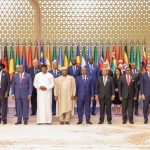The Jewish state is under siege not just by its neighbors, but also by a number of other countries.
WELT has got intelligence material demonstrating the existence of a trail all the way to the Sahara.
There is a militia gathering against Israel, and its commanders are discussing horrifying plans over the phone.
Since the start of the Gaza war, Israel’s opponents have competed with threats and extermination fantasies – and some are actively engaging to enable Hamas.
Hezbollah, the Lebanese terrorist organization, launches missiles into Israel practically every day, and terrorists have attempted to penetrate the nation through the northern border.
Israeli villages near Lebanon’s border had to be evacuated.
According to reports, Syrian militants have stepped out to support the struggle against Israel.
Yemen’s Houthis have officially declared war on Israel, targeting southern Israel with long-range missiles and drones that were previously shot down by an American Navy ship.
Shiite militias attack American military bases in Iraq.
Algeria’s parliament voted unanimously in favor of war against Israel.
Even in the depths of Africa, militias celebrate attacks on the Jewish state and lend support to its adversaries.
All of these activities are being carried out by Iran.
The Shiite dictatorship has constructed a global network of militias that it supports with weapons, money, and training, and which it then employs in its terror strategy – against the West in general, and the United States in particular.
Tehran has been extending its network in recent years, as evidenced by intelligence reports and investigations by Western financial investigators, which WELT has had exclusive access to.
As a result, Iran no longer only supports Shiite and Sunni organizations, but also others that have nothing to do with Israel or hardline Islam.
The path leads to the Sahara. The Polisario Front, a socialist group centered in the Tindouf refugee camps in southern Algeria, is a great example of Tehran’s strategy.
The Algerian-backed independence movement sees itself as the real representative of the people of Western Sahara, the desert region that runs along the Atlantic coast.
Following a United Nations-sponsored cease-fire in 1991, the Polisario Front surrendered when Morocco had the upper hand.
The organization controls a tiny portion of Western Sahara and operates a camp in the Algerian province of Tindouf, near the Moroccan border, where approximately 150,000 Sahrawis live.
Morocco severed relations with Iran in 2018 due to its support for the Polisario Front.
Hezbollah, Iran’s most powerful force, “sent military representatives to the Polisario, provided weapons to the front, and trained them in urban warfare,” Moroccan Foreign Minister Nasser Bourita told reporters at the time.
Tehran has sent surface-to-air missiles and drones to Polisario members in Western Sahara.
Hezbollah, which is aligned with Iran, has built up training camps in Algeria for Polisario fighters.
While officials of the Polisario Front and Hezbollah have refuted these charges, Morocco has stated that it possesses substantial intelligence on the Polisario Front and Hezbollah.
Last year, a Polisario Front representative alleged that Iran supplied them with “kamikaze” drones to deploy against Morocco via Algeria.
New intelligence reports, which WELT was able to see, back up Morocco’s claims.
Thus, the publication possesses recordings and transcripts of phone talks between Polisario representatives and an agent posing as a Hezbollah contact in Ivory Coast.
Mustafa Muhammad Lemine Al-Kitab is thus the Polisario’s liaison officer in Syria and is in charge of the Middle East.
The agent inquired about the situation. On October 23, almost two weeks after the attack on Israel in which Hamas slaughtered 1400 people.
The agent thus questioned about the issue with Lemine Al-Kitab in front of 140 individuals.
Hezbollah representative and the Polisario emissary discuss the possibilities of combined assaults against Israel with Hamas, Hezbollah, Algeria, and others during the conversation.
Lemine Al-Kitab offers to support the Polisario Front but emphasizes that its resources are not yet sufficient to attack the Israeli embassy in Morocco, for example.
In other conversations, he repeatedly asks for more support from Hezbollah and Iran.





